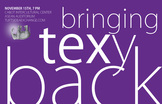
I'm coming back to this long-overdue post now in part because I've noticed through social media that they're soliciting speakers again, and to urge anyone among my readership in the Tufts community to apply. And also, anyone with access to any similar events, like TEDx for instance, to make a point of going and/or somehow getting involved. (I met many of the people involved in TEDxSomerville, and they are awesome, one of the TEX presenters will actually be speaking at their event). For something even more informal, check out NerdNite.
I want to talk specifically about TEX, and generally about what events like this have to offer. Let's start with my presentation and go from there...

You can link to a video of my talk by clicking here, or watch it at the bottom of this entry.
I became involved because they sent out a call that invited alumni to apply to be speakers at the event, which previously was mostly students with a few invited faculty members. As this was their second event, they're still very much in the process of figuring out how they'd like the organization to evolve. I'm fairly certain that they're on the right track.
I am on record somewhere in an admissions brochure as saying that one of the strengths of Tufts University as a graduate school is the quality of the undergraduate population. When I taught there as a graduate student, I was teaching highly motivated students who worked hard to get to where they were and definitely helped me grow as a teacher. This was my first time working closely with an undergraduate organization both as an alum and in a non-theatrical endeavor.
Speakers were asked to workshop their talks. Each speaker was assigned two members of the TEX team that would schedule meetings with them to rehearse their talks and provide feedback. (I referred to my team members, Lillian and Tessa, as my "keepers.") I met with my keepers something like four or five times in the two weeks leading up to the event. At first it was just a little disconcerting to be getting feedback from undergraduates. I could have been grading them only a few short months before. I put my ego aside and thought of it as getting teaching/lecture evaluations in real time. But really it was more useful than that. They had a great feel for what the needs of their event would be, and were really useful in helping me shape the presentation my ideas to a general audience (keep in mind that the last time I would have discussed this stuff in detail would have been my dissertation defense, to the only people in the world who had read them at that time). We were occasionally joined by other members of the event team, all of whom had already done their homework on my talk. On the whole their feedback was very useful and the process was a lot of fun.
The event itself was packed. The majority of the speakers were undergraduates, with three professors and two alums (including myself). The range of material was very broad, and the quality of the presentations was very high. I ran into one of my former acting students at the reception afterwards who told me that as soon as she saw my name listed as a speaker she knew that "someone was gonna get hit." (Take that as a spoiler if you haven't seen the video yet.
Now, why are these events important? Because as much as we are connected through the internet, we don't discuss ideas enough in real time outside of a classroom setting, especially to people who are outside of our narrow specialties. And when we speak only the language of our specialties, we can lose sight of our larger context. For any of us lucky enough to present at such events (and I hope to keep participating in this sort of thing) it gives us both perspective and and a chance to share. As for the events themselves and their video documentation, it's a revolutionary way to share the spread of ideas. I would venture that initiatives such as MITx are at least in part natural outgrowths of TED and the like. We're at an interesting place in the evolution of formal education, and many of the informal models are likely to take up more importance in coming years.
Here is my talk, I hope you enjoy it:
For the record, these were the questions on the TEX application:
1. You walk into an elevator and find yourself standing with the three innovative figures you admire the most. Who are they?
2. They are on their way to present at a TED conference and invite you to join them. You have 60 seconds to pitch an idea for a TED talk of your own. What do you say?
3. After your pitch, one of your fellow riders pushes back. I've heard of this type of thing before. How do you defend the uniqueness of your idea?
4. The elevator suddenly breaks down. What do you talk about while you wait for the repairman?
I do not remember all of my answers. I do remember that my three figures were V. Meyerhold (legendary Russian theatre director), Richard Feynman (legendary physicist), and Miyamoto Musashi (legendary samurai).
 RSS Feed
RSS Feed